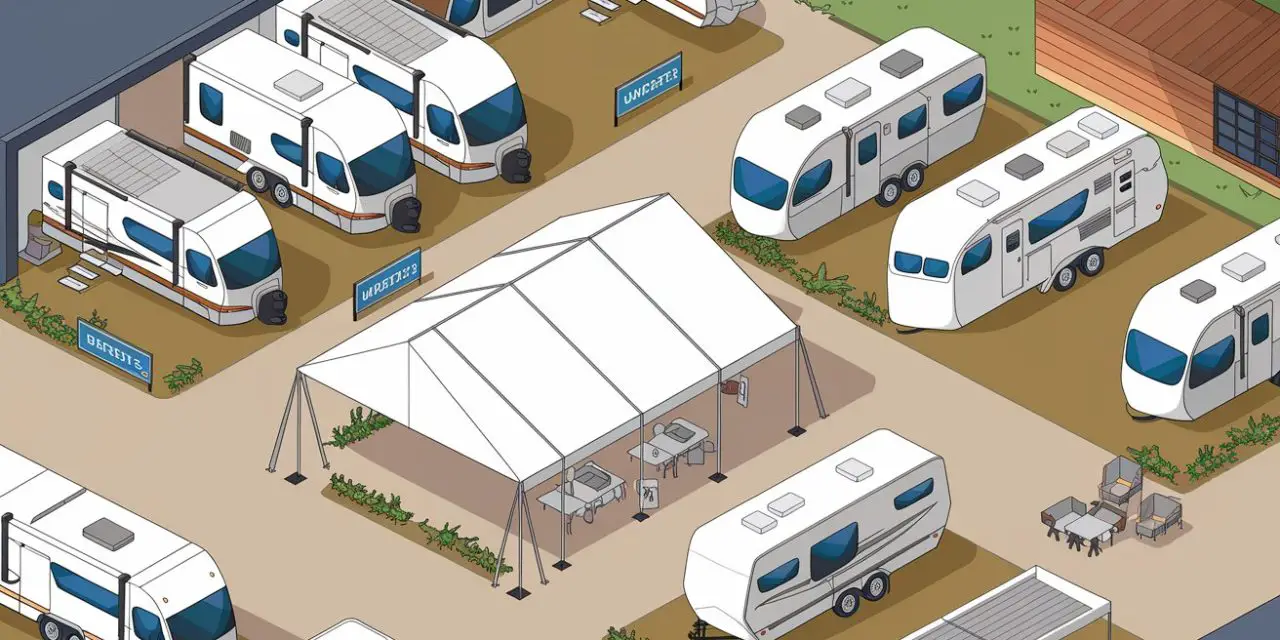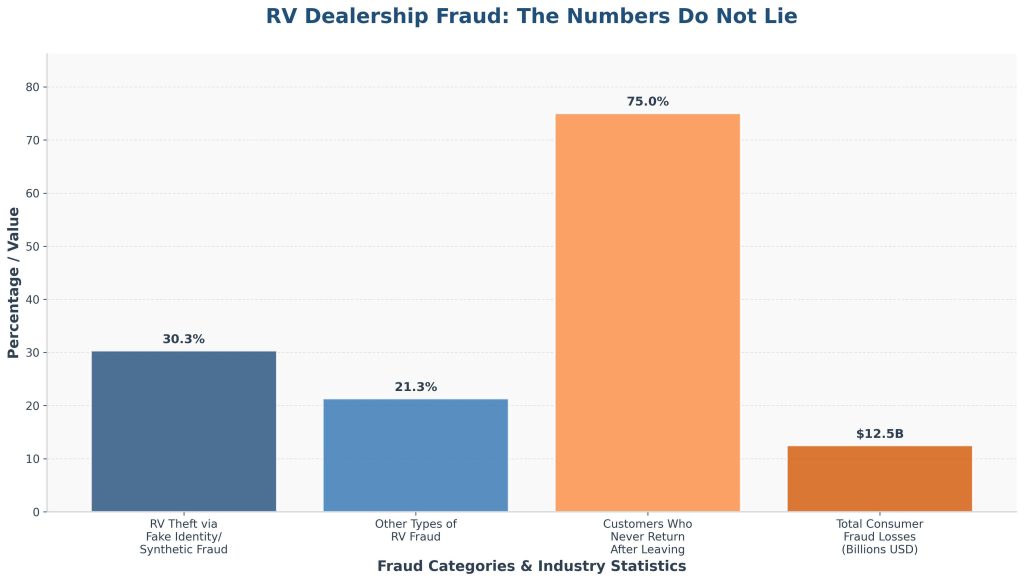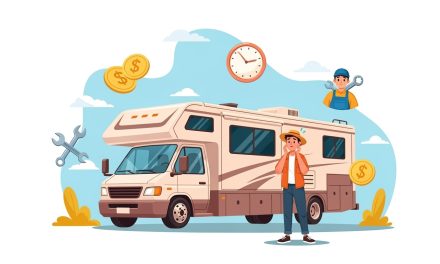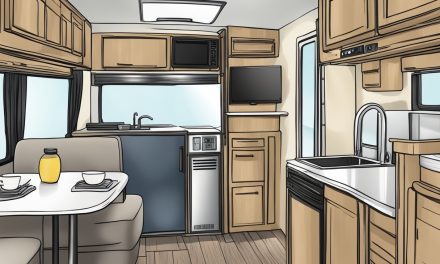You’re about to discover the dark secrets that some RV dealerships don’t want you to know. With the economy becoming more unpredictable and many Americans considering RV life as their pathway to financial freedom, unscrupulous dealers are sharpening their tactics to separate you from your hard-earned money.
Ron Burdge, a legendary RV lemon law attorney with over 40 years of experience, recently sat down with RV Wingman to expose the sneakiest, slimiest, and most manipulative tricks certain RV dealers are using in 2025. These aren’t just shady practices—many of them are downright illegal, designed to catch you off guard when you’re most vulnerable.
Whether you’re buying your first RV or your fifth, the scams we’re about to reveal could save you thousands of dollars and countless headaches. From the infamous “service stroll” to updated versions of classic bait-and-switch schemes, these dealer tricks are more sophisticated than ever before.
Would you like to save this article?
The Numbers Don’t Lie: RV Fraud is Everywhere
Before we dive into specific scams, let’s look at the shocking statistics. According to recent industry surveys, a staggering 30.3% of RV dealers reported having an RV stolen due to fake identity or synthetic fraud in the past 12 months alone. An additional 21.3% of dealers experienced other types of fraud, meaning over half of all RV dealerships are dealing with fraudulent activities.
Perhaps most telling is this statistic: 75% of customers who leave an RV dealership never return. This creates enormous pressure on salespeople to close deals by any means necessary—including using the manipulative tactics we’re about to expose.
1. The “Service Stroll” – Catching You When You’re Most Vulnerable
The Setup: You’re sitting in the service department waiting area, frustrated because your slide-out isn’t working properly, when a friendly person strikes up a conversation about your RV problems.
How It Works: This isn’t a coincidence. When sales are slow, some dealership salespeople are specifically trained to patrol the service area, looking for vulnerable customers. They’ll pretend to be fellow RV owners getting their own units serviced, building trust through shared experiences.
The conversation naturally progresses to discussing your RV’s problems, and suddenly this “helpful stranger” mentions they just bought a newer model because of similar issues. Before you know it, they’re introducing you to “their salesperson” who gave them such a great deal.
The Reality Check: This entire interaction is scripted. Both people work for the dealership, and you’ve just been targeted for a coordinated sales attack when you’re most vulnerable—dealing with expensive repairs and questioning your current RV’s reliability.
Your Takeaway: If someone approaches you in a service area and the conversation quickly turns to new RV purchases, politely excuse yourself. Real RV owners in service areas are usually focused on their own problems, not helping dealerships make sales.
“It’s slick because it gets the buyer at a time when they aren’t even a buyer… they’re basically checking in and then what they will do is they will just act like I’m just sort of wasting some time.” – Ron Burdge, RV Lemon Law Attorney
2. The Classic Bait-and-Switch (Still Alive in 2025)
The Setup: You see an amazing deal advertised online or in print—a specific RV model with detailed specifications and an incredible price.
How It Works: When you arrive at the dealership asking about the advertised RV, you’re told it “just sold not a half an hour ago.” But don’t worry! They have something “even better” at about the same price (which is inevitably higher).
The Psychology: Dealers know that statistically, people buy when they’re physically in the store, not over the phone. They also know that approximately 75% of people who leave a dealership never come back, so they have one shot to close you.
Your Protection Strategy: Before making the trip, call and ask specifically: “Do you still have [make, model, year, stock number] available?” Don’t mention you’re coming immediately. If it’s “gone” by the time you arrive, you’ve likely encountered a bait-and-switch operation.
The VIN Number Test: Always ask for the Vehicle Identification Number (VIN) of any advertised RV. Every RV has a unique VIN, so if they can’t provide it or the VIN doesn’t match when you arrive, you know you’re being scammed.
3. The Phantom Inventory Scam
The Modern Twist: Some dealers create elaborate websites showcasing hundreds of RVs they don’t actually own. They copy legitimate ads from other dealers and promise delivery to your location.
How You Get Caught: After you agree to purchase, they scramble to acquire the RV from the actual dealer, but at a higher price than advertised. By the time the RV arrives at your house, the original deal has mysteriously changed.
Red Flags to Watch:
- Dealers who only offer “delivery” options
- Websites with unusually large inventory
- Prices significantly below market value
- Reluctance to allow in-person inspection
4. The Service Department Pressure Play
Beyond the service stroll, unethical dealers use your service appointments as sales opportunities in other ways:
- The Repair Scare: Inflating repair costs to make trading up seem logical
- The Parts Shortage: Claiming parts are unavailable for your current RV
- The Safety Concern: Suggesting your RV is unsafe to continue using
Your Defense: Always get second opinions on major repairs and research parts availability independently before making any trade-in decisions based on service department recommendations.
5. The Finance Office Shuffle
The Setup: You’ve negotiated a fair price and are ready to sign paperwork in the finance office.
Hidden Tricks:
- Adding charges that were promised to be “free”
- Bundling unwanted warranties or services
- Changing interest rates at the last minute
- Adding “dealer fees” not disclosed earlier
Protection Strategy: Read every line of every document. Don’t sign anything with blank spaces, and don’t let anyone rush you through the paperwork process.
6. The Trade-In Undervalue Scam
How It Works: Dealers drastically undervalue your trade-in, then markup their RV to compensate, making you think you’re getting a great deal on the new unit.
The Math Trick: They might offer you $20,000 less than your RV is worth, then give you a $15,000 “discount” on their RV, making you feel like you saved money while actually losing $5,000.
Your Protection: Research your RV’s value independently using resources like NADA Guides before stepping foot on a dealer lot.
7. The Urgency Manipulation
Common Phrases:
- “This price is only good today”
- “I have another buyer coming tomorrow”
- “Interest rates are going up next week”
- “This is the last one like this we’ll ever get”
The Reality: These are artificial pressure tactics. Legitimate deals don’t require split-second decisions, and honest dealers understand that buying an RV is a major financial decision requiring careful consideration.
“Every state has a law against somebody doing something that is unfair or deceptive in the course of a consumer transaction… most people don’t realize it’s happening so they don’t realize they’re being victimized.” – Ron Burdge
What to Do If You’ve Been Scammed
Immediate Steps:
- Document Everything: Keep all paperwork, emails, and written communications
- Contact Dealer Management: Start with the general manager, not the salesperson who deceived you
- Know Your Rights: Many states have “cooling off” periods for major purchases
If the Dealer Won’t Help:
- File Complaints: Contact your state’s DMV dealer licensing division (often more effective than the Better Business Bureau)
- Consult an Attorney: RV lemon law attorneys like the Burdge & Wells Law Office specialize in these situations
- Report to Authorities: Contact your state Attorney General’s office
Documentation Is Key:
- VIN numbers of all RVs discussed
- Names of all dealership employees involved
- Exact quotes and promises made
- Any written materials or advertisements
How to Protect Yourself: Your RV Buying Checklist
Before You Visit:
- ✅ Research the dealership’s Better Business Bureau rating
- ✅ Read recent customer reviews on multiple platforms
- ✅ Have financing pre-approved from your bank or credit union
- ✅ Know your trade-in’s value from independent sources
At the Dealership:
- ✅ Bring a knowledgeable friend for a second opinion
- ✅ Take your time—don’t be rushed
- ✅ Get all promises in writing
- ✅ Verify VIN numbers match advertisements
During Negotiations:
- ✅ Negotiate the RV price separately from your trade-in
- ✅ Understand all fees before signing
- ✅ Read every document completely
- ✅ Don’t sign anything with blank spaces
The Bottom Line: Trust But Verify
The RV industry has many honest, reputable dealers who genuinely want to help you find the right recreational vehicle for your needs. However, the combination of economic uncertainty and the high-pressure nature of RV sales creates opportunities for unscrupulous dealers to take advantage of unsuspecting buyers.
Remember: A legitimate dealer will never pressure you into making an immediate decision, will provide all information transparently, and will stand behind their promises with written documentation.
Your dream of RV ownership doesn’t have to become a financial nightmare. By staying informed about these common scams and maintaining a healthy skepticism, you can navigate the RV buying process successfully and find a dealer who truly has your best interests at heart.








